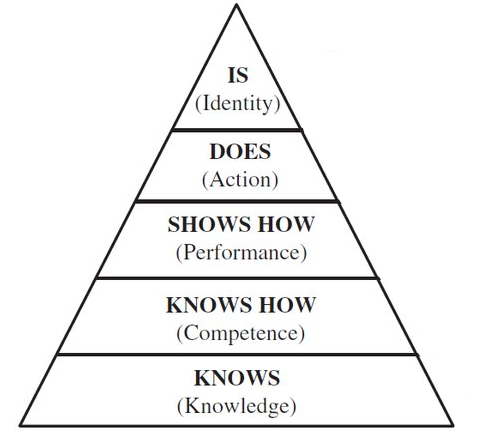About the Framework
Development of the Competency-Based Assessment (CBA) Framework began with familiarisation of the Association for Nutrition (AfN) system of mapping course modules to competencies as part of the degree accreditation application. We then mapped five Higher Education Institutions undergraduate nutrition programmes to the AfN competencies. At the time, four of the five programmes had received AfN degree accreditation. Using this mapping we could see what assessments were linked to each competency through the modules.
After this, we mapped the AfN list of competencies to Miller’s pyramid. Miller’s pyramid (1990)(a) provides a framework for assessing clinical competence in medical-based education to assist educators in matching learning outcomes (competencies) with expectations of what the learner should be able to do at any stage. Miller’s pyramid highlights the importance of skills beyond knowledge. Cruess et al. extended the pyramid framework in 2016 to include the development of a professional identity(b). The pyramid is divided into five hierarchical levels:
- Knows - forms the base of the pyramid and the foundation for building competence.
- Knows How - uses knowledge in the acquisition, analysis, and interpretation of data and the development of a plan.
- Shows - requires the learner to demonstrate the integration of knowledge and skills in clinical situations.
- Does – represents action and assessment of the individual’s ability to function independently in the clinical setting. Assessing performance.
- Is – presence of a professional identity.
Next, we listed all assessment types currently used in nutrition programmes and categorised them depending on their level on Miller’s pyramid. These were:

Knows
- Multiple-choice questionnaire (MCQ)
- Short answer questions
- Final written exam
- Essay/report
- Theory assessment
- Online quiz
Knows How
- Case study
- Developing a plan/study/intervention
- Analysis/interpretation of data
- Lab reports
- Thesis
- Literature review
- Presentation
- Debate
- Food diary
- Research project*
Shows
- Dietary assessment
- Objective structured clinical examination (OSCE)
- Role-play exercise
- Simulation exercise
- Lab practicals and exams
- Research project*
Does
- Direct observation - eg. OSCE or supervisor performance evaluation/report
- Reflective practice
- Work-based placement
- Portfolios
- Interview
- Research project*
(a) Miller, G E. The assessment of clinical skills/competence/performance, Academic Medicine: September 1990 - Volume 65 - Issue 9 - p S63-7
(b) Cruess RL, Cruess SR, Steinert Y. Amending Miller's Pyramid to Include Professional Identity Formation. Acad Med. 2016 Feb;91(2):180-5. doi: 10.1097/ACM.0000000000000913. PMID: 26332429.
* Research project - depending on the context of the research this can assess competence on the Knows How, Shows, or Does level.